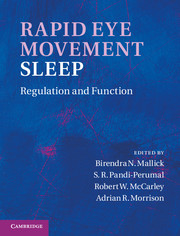Book contents
- Frontmatter
- Contents
- Contributors
- Preface
- Acknowledgments
- Organization
- Section I Historical context
- Section II General biology
- Section III Neuronal regulation
- Section IV Neuroanatomy and neurochemistry
- Section V Functional significance
- 30 Significance of deprivation studies
- 31 Modulation of body core temperature in NREM sleep and REM sleep
- 32 Sleep-related hippocampal activation: implications for spatial memory consolidation
- 33 The role of REM sleep in memory consolidation, enhancement, and integration
- 34 The role of REM sleep in emotional brain processing
- 35 REM-sleep loss, oxidative damage, and apoptosis
- 36 The role of REM sleep in maintaining neuronal excitability and its possible mechanism of action
- 37 Comparison of REM sleep-deprivation methods: role of stress and validity of use
- 38 REM sleep in patients with depression
- 39 Proteins and neuropeptides in REM-sleep regulation and function
- Section VI Disturbance in the REM sleep-generating mechanism
- Index
- Plate section
- References
33 - The role of REM sleep in memory consolidation, enhancement, and integration
from Section V - Functional significance
Published online by Cambridge University Press: 07 September 2011
- Frontmatter
- Contents
- Contributors
- Preface
- Acknowledgments
- Organization
- Section I Historical context
- Section II General biology
- Section III Neuronal regulation
- Section IV Neuroanatomy and neurochemistry
- Section V Functional significance
- 30 Significance of deprivation studies
- 31 Modulation of body core temperature in NREM sleep and REM sleep
- 32 Sleep-related hippocampal activation: implications for spatial memory consolidation
- 33 The role of REM sleep in memory consolidation, enhancement, and integration
- 34 The role of REM sleep in emotional brain processing
- 35 REM-sleep loss, oxidative damage, and apoptosis
- 36 The role of REM sleep in maintaining neuronal excitability and its possible mechanism of action
- 37 Comparison of REM sleep-deprivation methods: role of stress and validity of use
- 38 REM sleep in patients with depression
- 39 Proteins and neuropeptides in REM-sleep regulation and function
- Section VI Disturbance in the REM sleep-generating mechanism
- Index
- Plate section
- References
Summary
Summary
The last decade has seen a dramatic increase in our understanding of the role of sleep in off-line memory reprocessing, with published articles on sleep and memory increasing more than five-fold from the 1990s to 2008. While there is now clear evidence that sleep can enhance performance on previously learned tasks, several key questions remain unanswered. Chief among these are (1) the types of learning and memory that are enhanced; (2) the nature of the enhancement; (3) the differential roles of the various sleep stages; and (4) the cellular, molecular, and neurophysiological processes that mediate this enhancement. In this chapter, we review our current state of knowledge in regard to each of these questions, and then focus on the specific role of REM sleep.
- Type
- Chapter
- Information
- Rapid Eye Movement SleepRegulation and Function, pp. 328 - 338Publisher: Cambridge University PressPrint publication year: 2011
References
- 1
- Cited by



